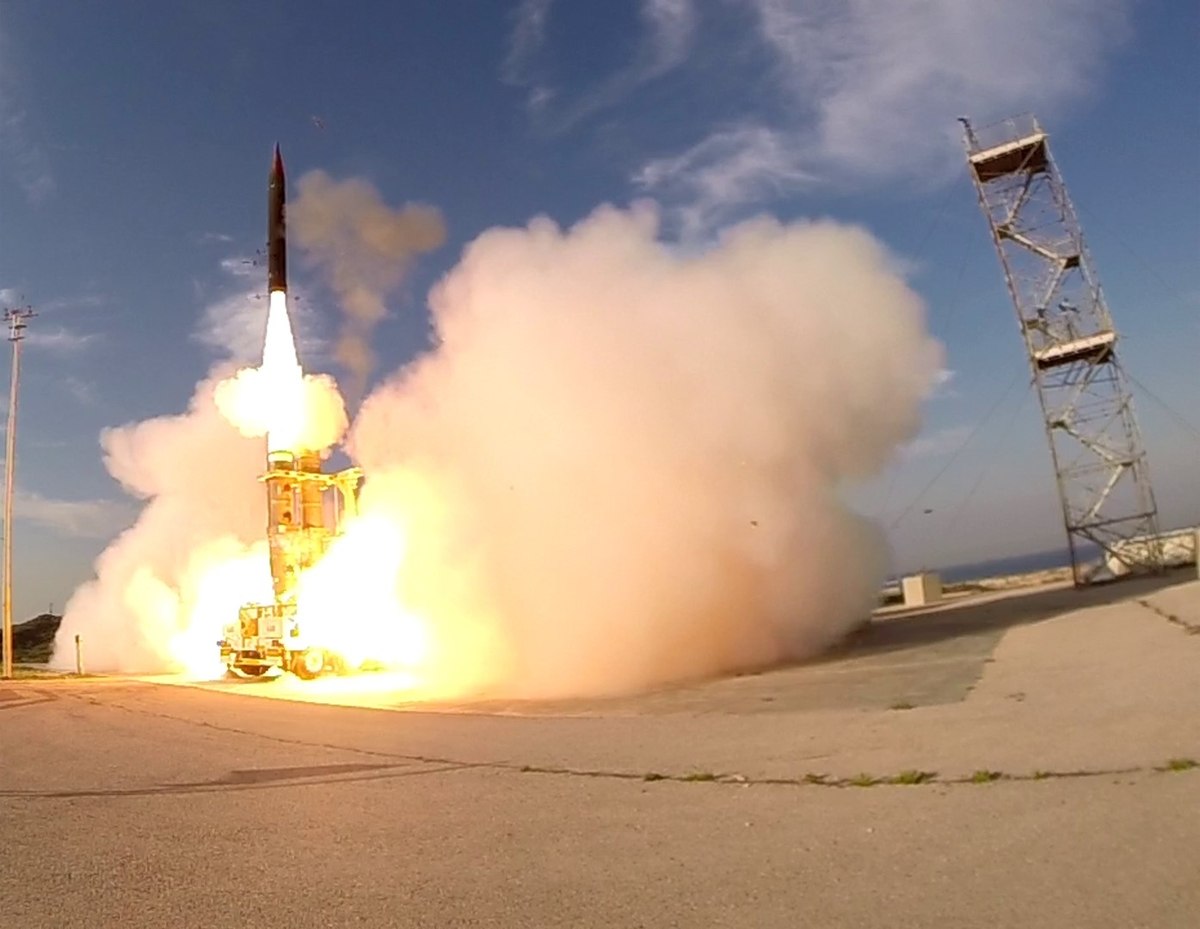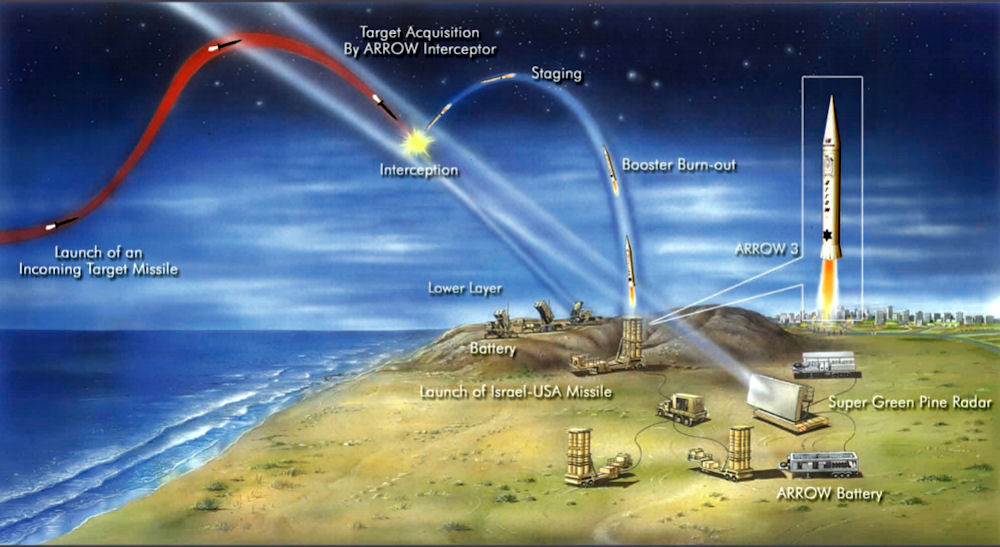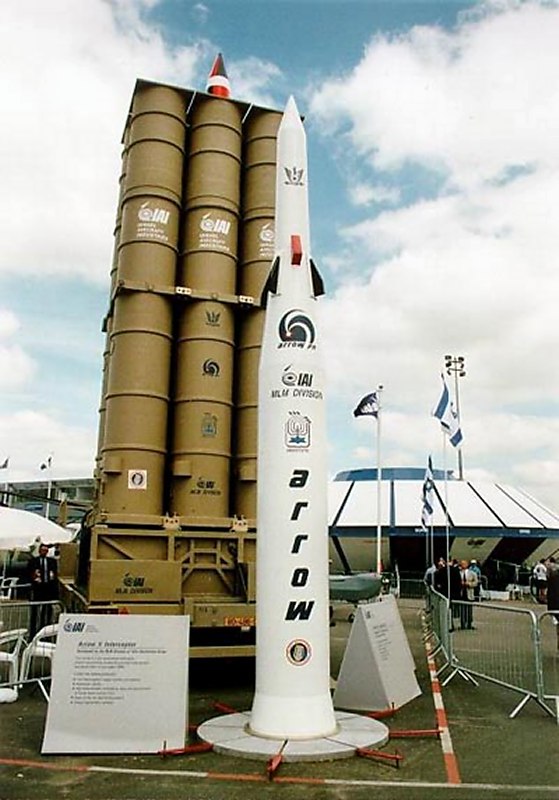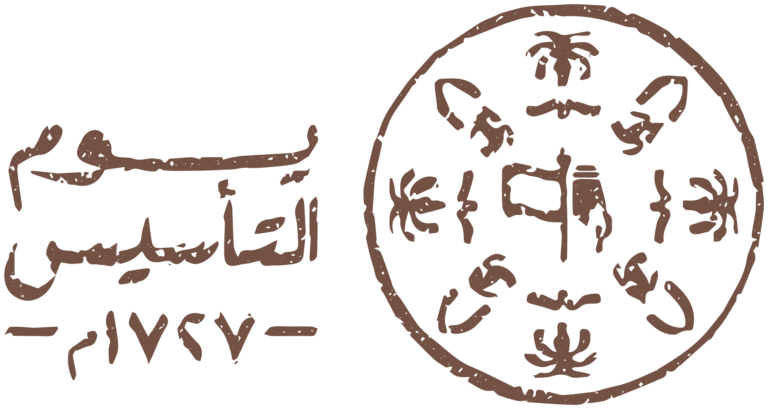Pentagon eyes intimate R&D tie-up with UAE based on US-Israel model
By: Barbara Opall-Rome 4 days ago
5428

The U.S. is considering R&D cooperation with the UAE like it did for the Arrow — the first major U.S.-Israel cooperative project that has continuously expanded into the multitier missile defense and interoperability program that exists today. (Israel Aerospace Industries)
DUBAI, United Arab Emirates — U.S. and Emirati defense officials will meet next month in Abu Dhabi to continue discussions on technology security protocols that aim to elevate the level at which Washington can share and ultimately co-develop sensitive technologies with one of its most prized strategic partners in the region.
In interviews here at the Dubai Airshow, U.S. executives supportive of more intimate ties with their Emirati partners cited UAVs, sophisticated munitions and innovative means of coastal defense as examples of potential projects for joint development once the United Arab Emirates codifies and implements a technology security and export control regime.
“We want them to create their own watchdog similar to our DTSA,” Danny Sebright, president of the U.S.-U.A.E. Business Council said of the Pentagon’s Defense Technology Security Administration.
“Of course they will adapt it to their own conditions, but if we’re going to take this partnership to a higher, fifth-generation level, they need a system that really monitors and controls classified information and technology, has the authority to conduct inspections, and makes sure that what we entrust to them for specific purposes will remain that way.”
Sebright, a former Pentagon official who spent two years in Israel during the first Gulf War before serving for a decade as the Israel desk chief in the U.S. Defense Department’s policy shop, said the effort should eventually lead to levels of strategic cooperation similar to what the U.S. had in place with Israel in the late 1980s and early 1990s.
“We really want to see if we can do joint R&D cooperation like the Arrow back in the day,” Sebright said of the first major U.S.-Israel cooperative project that has continuously expanded into the multitier missile defense and interoperability program that exists today.
After a slight pause, Sebright qualified his Israel comparison by saying: “In fact, it won’t be like the joint R&D we do with Israel, where the lion’s share of funding comes from our own budget. Here’s a chance where we can work with the Emiratis on some common problems to the benefit of both militaries and get them to pay a fair share of the bill.”
The U.S. has invested billions of dollars on cooperative missile development programs with Israel and has committed to building upon the foundational Arrow program and its offshoots with annual spending of $500 million over the coming decade.
Sign up for our Daily News Roundup
The top Defense News stories of the day
In a Nov. 12 dinner gathering of Emirati officials and U.S. government and business leaders, Ellen Lord, U.S. undersecretary of defense for acquisition, technology and logistics, said a defense cooperation agreement signed last May provides the framework for intensified cooperation between the two defense establishments.
“Currently, we are seeing an acceleration in our ties,” she said.
Citing the upcoming biannual meeting in Abu Dhabi, Lord said the high-level forum would address ways the two countries are working to build “technology security protocols and a more robust export control infrastructure” that will allow Washington to sell increasingly sensitive front-line weaponry.
“This institutional development is critical not just for ensuring that advanced U.S. technology we release to our partners remains secure, but it will also benefit the Emiratis as the UAE’s domestic defense industry takes off and becomes a force in the global marketplace,” she said.
Fahad Mohammed Al Mheiri, an executive at the Emirates Defence Industries Company cited indigenous development and production of UAVs, advanced weaponry, naval systems and cyber as sectors for the nation’s long-term industrial goals.
However, in the short-term, Al Mheiri said EDIC was focused on more modest goals of merging disparate companies and capabilities into a truly integrated, cost-effective organization that will be able to serve as the backbone of the UAE industrial base.
Interviewed here at the Dubai Airshow, Al Mheiri said EDIC is legally mandated to be the umbrella organization for cultivating the manufacturing practices, technological capabilities and business culture needed to provide for national industrial needs. “In the world of defense, we have four companies focused on the needs and expectations of our end user, the UAE Armed Forces,” he said. “Right now, those expectations are relatively modest, with a focus on added value and sustainability. But here in the UAE, we always look to the future, and of course increasingly sophisticated indigenous development is part of our plan.”
Steve Bryen, the U.S. official who founded DTSA in 1985 under the Reagan administration, said it makes sense the UAE is being groomed as the second country in the region behind Israel for such intimate cooperation.
“They have been and will be great partners. They are obviously challenged from Iran from the threat of terrorism in all its forms. We share very strong and common interests, and they should be given more capability and responsibility,” he said.
Specifically in regard to a UAE version of DTSA, Bryen said the two sides must put in place clear rules of disclosure and guidelines for export licensing as well as guidelines to maintain long-term controls. “DTSA was always involved as much with disclosure as with export control. People have to be trained properly to understand what is allowed and not allowed; and it must be a system that is empowered to coordinate across all relevant sectors of government and industry,” he said.
He noted that years after such standards and guidelines were instituted with the Israelis, serious concerns remained that slowed or halted the natural progression of strategic cooperation. “The big issue with Israel for many years was China, and that held up the process for an extended period of time. It took many rounds of intense negotiations and corrective measures until those big issues were finally resolved.”
Sebright said that unlike the many knots that had to be untangled with Israel, the UAE has “a zero record of ever giving away U.S. technology or selling it unlawfully.”
“We had some isolated instances of things getting lost in action, but we believe they will be receptive to what needs to be done on our end to allow us to help them build up their defense industrial base,” Sebright said.
In a report published last month by the U.S.-U.A.E. Business Council, Sebright elaborated on three key areas in which the UAE has contributed to U.S. national security interests in the region and beyond:
1. Active partner in U.S.-led coalition operations: While the UAE did not join the U.S.-led invasion of Iraq, it is the only Arab country to have participated with Washington in multilateral operations in six countries, including Somalia, Bosnia-Kosovo, Afghanistan, Libya and the campaign against the Islamic State group in Syria and Iraq.
During the initial air campaign against ISIS, Emerati Air Force pilots ― including the country’s first female pilot, Maj. Mariam al-Mansouri ― carried out more strikes in Syria than any other country besides the U.S.
2. Accommodating host to some 5,000 U.S. forces: Under a newly expanded defense cooperation agreement signed in May, the UAE will continue to provide a home to the U.S. Air Force’s 380th Air Expeditionary Wing at Al Dhafra Air Force Base in Abu Dhabi. Al Dhafra serves as the only overseas base for F-22 jets and is home to U.S. Air Force Central Command’s Air Warfare Center, which operates an integrated air- and missile-defense center, search-and-rescue training, and advanced tactical leadership courses.
As for sea power, two key deep harbor ports — Jebel Ali and Fujairah — will remain accessible U.S. aircraft carriers. In recent years, the UAE has been host to a sizable number of special operations forces from U.S. Central Command.
3. Counterterror Cooperation: Routinized intelligence sharing and a bilateral financial counterterrorism task force heads the list of nonkinetic manifestations of counterterror cooperation. The UAE was first in the region to join the U.S. Customs and Border Protection agency’s Container Security Initiative, allowing U.S. and Emirati officials to work together inside Emirati ports to inspect U.S.-bound containers. Similar arrangements are in place with the U.S. Department of Energy to improve detection of nuclear materials in cargo containers, and with the U.S. State Department to halt shipments associated with weapons of mass destruction.
The two countries also operate a pre-clearance program that allows inspections of U.S.-bound commercial passengers at Abu Dhabi International Airport prior to departure. This multifaceted counterterror program has been credited with foiling a number of terror plots, including a 2010 plan by al-Qaida in the Arabian Peninsula to send explosives into the U.S. via cargo planes. Finally, Abu Dhabi in recent years has helped Washington reduce terror suspects held at Guantanamo Bay by agreeing to take custody of several Yemeni and Afghan detainees.
https://www.defensenews.com/digital...ased-on-us-israel-model/#.WhF5YfUJ5Mo.twitter
سيجتمع الشهر المقبل في ابوظبي مسؤولوا الدفاع الاماراتيين والامريكيين لمواصلة النقاش حول بروتوكولات أمن التكنولوجيا التي تهدف لرفع المستوى الذي يمكن واشنطن من مشاركة وتطوير التكنولوجيا الحساسة مع احد اهم شركائها الاستراتيجيين في المنطقة .
الحديث يدور حول انظمة الطائرات بدون طيار , الذخائر المتقدمة , الوسائل المبتكرة في الدفاع الساحلي كبعض الامثلة لمشاريع الشراكة مع الامارات عند الاتفاق ..
الكثير من التفاصيل في المقال اعلاه ... ومن ضمنه : تطوير مشروع مشابه للـ Arrow الامريكي الاسرائيلي ,, لكن هذه المرة , مع الامارات العربية المتحدة ..
By: Barbara Opall-Rome 4 days ago
5428

The U.S. is considering R&D cooperation with the UAE like it did for the Arrow — the first major U.S.-Israel cooperative project that has continuously expanded into the multitier missile defense and interoperability program that exists today. (Israel Aerospace Industries)
DUBAI, United Arab Emirates — U.S. and Emirati defense officials will meet next month in Abu Dhabi to continue discussions on technology security protocols that aim to elevate the level at which Washington can share and ultimately co-develop sensitive technologies with one of its most prized strategic partners in the region.
In interviews here at the Dubai Airshow, U.S. executives supportive of more intimate ties with their Emirati partners cited UAVs, sophisticated munitions and innovative means of coastal defense as examples of potential projects for joint development once the United Arab Emirates codifies and implements a technology security and export control regime.
“We want them to create their own watchdog similar to our DTSA,” Danny Sebright, president of the U.S.-U.A.E. Business Council said of the Pentagon’s Defense Technology Security Administration.
“Of course they will adapt it to their own conditions, but if we’re going to take this partnership to a higher, fifth-generation level, they need a system that really monitors and controls classified information and technology, has the authority to conduct inspections, and makes sure that what we entrust to them for specific purposes will remain that way.”
Sebright, a former Pentagon official who spent two years in Israel during the first Gulf War before serving for a decade as the Israel desk chief in the U.S. Defense Department’s policy shop, said the effort should eventually lead to levels of strategic cooperation similar to what the U.S. had in place with Israel in the late 1980s and early 1990s.
“We really want to see if we can do joint R&D cooperation like the Arrow back in the day,” Sebright said of the first major U.S.-Israel cooperative project that has continuously expanded into the multitier missile defense and interoperability program that exists today.
After a slight pause, Sebright qualified his Israel comparison by saying: “In fact, it won’t be like the joint R&D we do with Israel, where the lion’s share of funding comes from our own budget. Here’s a chance where we can work with the Emiratis on some common problems to the benefit of both militaries and get them to pay a fair share of the bill.”
The U.S. has invested billions of dollars on cooperative missile development programs with Israel and has committed to building upon the foundational Arrow program and its offshoots with annual spending of $500 million over the coming decade.
Sign up for our Daily News Roundup
The top Defense News stories of the day
In a Nov. 12 dinner gathering of Emirati officials and U.S. government and business leaders, Ellen Lord, U.S. undersecretary of defense for acquisition, technology and logistics, said a defense cooperation agreement signed last May provides the framework for intensified cooperation between the two defense establishments.
“Currently, we are seeing an acceleration in our ties,” she said.
Citing the upcoming biannual meeting in Abu Dhabi, Lord said the high-level forum would address ways the two countries are working to build “technology security protocols and a more robust export control infrastructure” that will allow Washington to sell increasingly sensitive front-line weaponry.
“This institutional development is critical not just for ensuring that advanced U.S. technology we release to our partners remains secure, but it will also benefit the Emiratis as the UAE’s domestic defense industry takes off and becomes a force in the global marketplace,” she said.
Fahad Mohammed Al Mheiri, an executive at the Emirates Defence Industries Company cited indigenous development and production of UAVs, advanced weaponry, naval systems and cyber as sectors for the nation’s long-term industrial goals.
However, in the short-term, Al Mheiri said EDIC was focused on more modest goals of merging disparate companies and capabilities into a truly integrated, cost-effective organization that will be able to serve as the backbone of the UAE industrial base.
Interviewed here at the Dubai Airshow, Al Mheiri said EDIC is legally mandated to be the umbrella organization for cultivating the manufacturing practices, technological capabilities and business culture needed to provide for national industrial needs. “In the world of defense, we have four companies focused on the needs and expectations of our end user, the UAE Armed Forces,” he said. “Right now, those expectations are relatively modest, with a focus on added value and sustainability. But here in the UAE, we always look to the future, and of course increasingly sophisticated indigenous development is part of our plan.”
Steve Bryen, the U.S. official who founded DTSA in 1985 under the Reagan administration, said it makes sense the UAE is being groomed as the second country in the region behind Israel for such intimate cooperation.
“They have been and will be great partners. They are obviously challenged from Iran from the threat of terrorism in all its forms. We share very strong and common interests, and they should be given more capability and responsibility,” he said.
Specifically in regard to a UAE version of DTSA, Bryen said the two sides must put in place clear rules of disclosure and guidelines for export licensing as well as guidelines to maintain long-term controls. “DTSA was always involved as much with disclosure as with export control. People have to be trained properly to understand what is allowed and not allowed; and it must be a system that is empowered to coordinate across all relevant sectors of government and industry,” he said.
He noted that years after such standards and guidelines were instituted with the Israelis, serious concerns remained that slowed or halted the natural progression of strategic cooperation. “The big issue with Israel for many years was China, and that held up the process for an extended period of time. It took many rounds of intense negotiations and corrective measures until those big issues were finally resolved.”
Sebright said that unlike the many knots that had to be untangled with Israel, the UAE has “a zero record of ever giving away U.S. technology or selling it unlawfully.”
“We had some isolated instances of things getting lost in action, but we believe they will be receptive to what needs to be done on our end to allow us to help them build up their defense industrial base,” Sebright said.
In a report published last month by the U.S.-U.A.E. Business Council, Sebright elaborated on three key areas in which the UAE has contributed to U.S. national security interests in the region and beyond:
1. Active partner in U.S.-led coalition operations: While the UAE did not join the U.S.-led invasion of Iraq, it is the only Arab country to have participated with Washington in multilateral operations in six countries, including Somalia, Bosnia-Kosovo, Afghanistan, Libya and the campaign against the Islamic State group in Syria and Iraq.
During the initial air campaign against ISIS, Emerati Air Force pilots ― including the country’s first female pilot, Maj. Mariam al-Mansouri ― carried out more strikes in Syria than any other country besides the U.S.
2. Accommodating host to some 5,000 U.S. forces: Under a newly expanded defense cooperation agreement signed in May, the UAE will continue to provide a home to the U.S. Air Force’s 380th Air Expeditionary Wing at Al Dhafra Air Force Base in Abu Dhabi. Al Dhafra serves as the only overseas base for F-22 jets and is home to U.S. Air Force Central Command’s Air Warfare Center, which operates an integrated air- and missile-defense center, search-and-rescue training, and advanced tactical leadership courses.
As for sea power, two key deep harbor ports — Jebel Ali and Fujairah — will remain accessible U.S. aircraft carriers. In recent years, the UAE has been host to a sizable number of special operations forces from U.S. Central Command.
3. Counterterror Cooperation: Routinized intelligence sharing and a bilateral financial counterterrorism task force heads the list of nonkinetic manifestations of counterterror cooperation. The UAE was first in the region to join the U.S. Customs and Border Protection agency’s Container Security Initiative, allowing U.S. and Emirati officials to work together inside Emirati ports to inspect U.S.-bound containers. Similar arrangements are in place with the U.S. Department of Energy to improve detection of nuclear materials in cargo containers, and with the U.S. State Department to halt shipments associated with weapons of mass destruction.
The two countries also operate a pre-clearance program that allows inspections of U.S.-bound commercial passengers at Abu Dhabi International Airport prior to departure. This multifaceted counterterror program has been credited with foiling a number of terror plots, including a 2010 plan by al-Qaida in the Arabian Peninsula to send explosives into the U.S. via cargo planes. Finally, Abu Dhabi in recent years has helped Washington reduce terror suspects held at Guantanamo Bay by agreeing to take custody of several Yemeni and Afghan detainees.
https://www.defensenews.com/digital...ased-on-us-israel-model/#.WhF5YfUJ5Mo.twitter
سيجتمع الشهر المقبل في ابوظبي مسؤولوا الدفاع الاماراتيين والامريكيين لمواصلة النقاش حول بروتوكولات أمن التكنولوجيا التي تهدف لرفع المستوى الذي يمكن واشنطن من مشاركة وتطوير التكنولوجيا الحساسة مع احد اهم شركائها الاستراتيجيين في المنطقة .
الحديث يدور حول انظمة الطائرات بدون طيار , الذخائر المتقدمة , الوسائل المبتكرة في الدفاع الساحلي كبعض الامثلة لمشاريع الشراكة مع الامارات عند الاتفاق ..
الكثير من التفاصيل في المقال اعلاه ... ومن ضمنه : تطوير مشروع مشابه للـ Arrow الامريكي الاسرائيلي ,, لكن هذه المرة , مع الامارات العربية المتحدة ..





